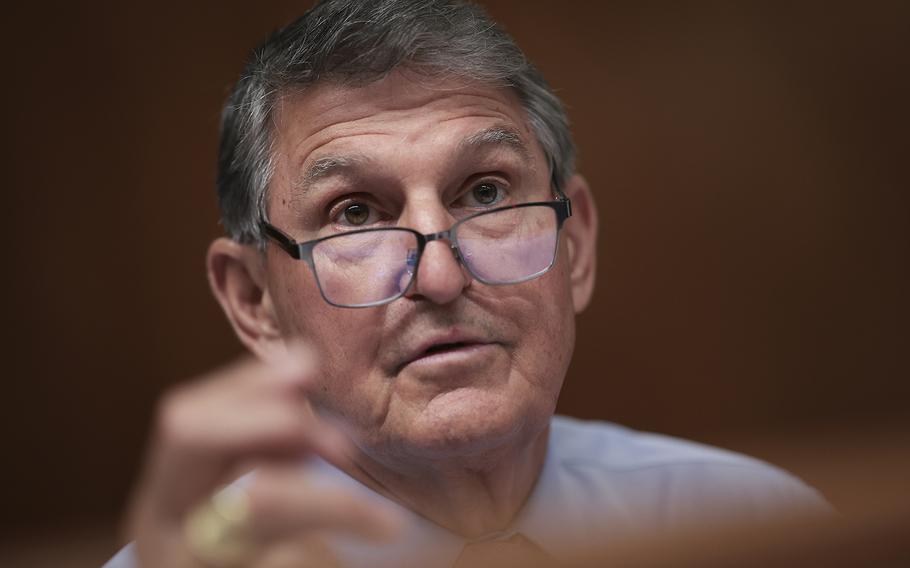
Sen. Joe Manchin (D-W.Va.) during a Financial Services and General Government Subcommittee hearing July 19, 2023, in Washington. (Win McNamee, Getty Images/TNS)
(Tribune News Service) — West Virginia Sen. Joe Manchin’s announcement that he won’t seek reelection means the end of years of liberal Democrats blaming him for nearly everything that goes wrong. It will also end years of careful hand-holding and management by Senate Democratic leaders and Presidents Barack Obama and Joe Biden.
They’re going to miss him when he’s replaced by a Republican in 2025, worsening Democrats’ odds of maintaining their slim Senate majority.
Manchin was once one of many less liberal Democrats but their ranks have thinned, making him one of the least liberal — a necessity for a Democrat representing a conservative Republican state like West Virginia. (1) Earlier this year, Manchin considered leaving the party and declaring himself an independent.
During the first two years of Biden’s presidency, Manchin was the swing vote on several key pieces of legislation and he relished his role as the make-or-break player. He could be difficult for Democratic leadership to deal with, sometimes denouncing bills he later found a way to support. He often clashed with the administration on climate and energy policy, with West Virginia coal-fueled skepticism. Negotiations over Biden’s “Build Back Better” initiative took months, as Senate Majority Leader Chuck Schumer and the White House worked to appease Manchin. Manchin later supported a scaled back version of Biden’s plan. (2)
He also stuck with the party in the final votes for Biden’s pandemic recovery bill. Those bills, along with the bipartisan infrastructure bill that Manchin helped draft, have been Democrats’ biggest legislative accomplishments during Biden’s presidency.
Manchin also was generally a reliable vote for Biden’s judicial and executive branch nominations, which was important with Democrats’ slim majority, because Republicans opposed nearly all of them. He’s been less partisan during the current Congress where Democrats have a 51-49 edge in the Senate and no longer need his vote every time, even placing holds on some nominations to fight for his interpretation of climate legislation. But overall, he’s supported both Obama’s and Biden’s nominations, including liberals such as Supreme Court Justice Ketanji Brown Jackson.
Manchin also helped the party in more subtle ways. By loudly and repeatedly setting himself up as the party’s center, he created room for others from Republican-leaning states, such as Montana Sen. Jon Tester, to vote for Democratic bills without seeming liberal.
It’s also worth noting that while Manchin could be difficult for Democrats to deal with, he stuck with them when Republicans held Senate majorities and the presidency. For example, when Republican John McCain was the famous deciding vote against repealing the Affordable Care Act, Manchin was with the 47 other Democrats who opposed the bill. He’s really best thought of as a moderate liberal, rather than a conservative Democrat.
In 1980, two years before Manchin was first elected to the West Virginia House of Delegates, the state was one of six (plus the District of Columbia) to vote for Jimmy Carter against Ronald Reagan. Only Georgia and Rhode Island were more Democratic that year. Forty years later, West Virginia is among the most Republican states and Manchin will be the last Democratic senator from there for the foreseeable future.
Manchin was frustrating for mainstream liberals and used his leverage to prevent some of what they wanted, but Democrats were far better off with him than they would have been with a Republican in his seat — and it wasn’t even close.
***
(1) Less informed progressives sometimes talked about finding a liberal primary challenger to defeat Manchin. But even if such a thing could be done Manchin, a former governor, was always personally popular. The state’s electorate could barely tolerate a moderate Democrat. A mainstream liberal would have no chance.
(2) Manchin wasn’t the only sticking point. House “squad” members and other liberal House Democrats held up progress because they didn’t like separating Build Back Better into two bills. Not surprisingly, they received a lot less criticism from liberal pundits and activists. In the end, both Manchin and House progressives were pragmatic enough to cut deals to pass both both bills.
Jonathan Bernstein is a Bloomberg Opinion columnist covering politics. A former professor of political science at the University of Texas at San Antonio, he wrote A Plain Blog About Politics. This column does not necessarily reflect the opinion of the editorial board or Bloomberg LP and its owners.
©2023 Bloomberg L.P.
Visit bloomberg.com/opinion.
Distributed by Tribune Content Agency, LLC.